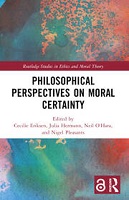Chapter 2 Socially Disruptive Technologies and Moral Certainty
Proposal review
Abstract
The work of Wittgenstein has so far received little attention from scholars working in the philosophy of technology. In this chapter, I relate my Wittgenstein-inspired account of moral certainty, which
conceives of moral certainty as the certainty of morally competent agents, to recent work on socially disruptive technologies and the phenomenon of technosocial disruption. In a complex interplay
with other factors, technologies such as artificially intelligent systems and robots challenge norms, practices, and concepts that play a fundamental role in human life. I argue that technosocial
disruption involves the disruption of moral certainty, and that we should refine our notion of moral certainty by integrating the idea of technological mediation. In our technological world, technology
mediates how something acquires the role of a moral certainty or loses it, and how moral certainty is manifested in different contexts. I discuss two examples of contexts in which technological
developments challenge moral agency at the level of moral certainty: the introduction of robots in elderly care practices and the potential use of ectogestative technology for foetal development.
Keywords
ethics & moral philosophy; philosophyDOI
10.4324/9781003178927-2ISBN
9781032006758, 9781032015095, 9781003178927Publisher
Taylor & FrancisPublisher website
https://taylorandfrancis.com/Publication date and place
2023Grantor
Imprint
RoutledgeClassification
Ethics and moral philosophy


 Download
Download